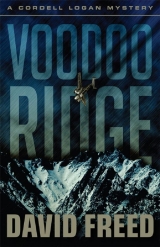
Текст книги "Voodoo Ridge"
Автор книги: David Freed
Жанр:
Триллеры
сообщить о нарушении
Текущая страница: 1 (всего у книги 17 страниц)
David Freed
Voodoo Ridge
For Robert and Rachel
EPIGRAPH
He who binds to himself a joy
Does the winged life destroy;
He who kisses the joy as it flies
Lives in eternity’s sunrise.
– WILLIAM BLAKE
PROLOGUE
1956, sixty miles north of Los Angeles…
It rained that night as if Noah and his ark were making a comeback. The first real blast of winter. Sleet whipped in cold and hard off the Pacific, pelting the runway at Santa Paula and raking the corrugated metal roof of watchman Herm Hoversten’s security shack like machine-gun fire. Not that Hoversten noticed, slumped at his desk, porcine nose bent sideways, drool pooling around his splayed marshmallow lips, fast asleep.
He was a doughy man who’d served briefly in the army, long enough for physicians to diagnose that his snoring through reveille each morning had less to do with draftee malingering than some severe, narcoleptic affliction rarely seen before. Granted a medical discharge and excused from combat duty in Korea, Hoversten soon landed the perfect job for the perfectly lethargic, surrounded by citrus groves, guarding a civilian airfield nearly as comatose as he was.
Not even when the door to the shack cracked open and the wind came howling in loud as a jet engine did he awaken. Only after the stranger booted him off his rickety swivel chair and onto the plywood floor did Hoversten come to. Don’t Be Cruel, the new tune from that boy from Mississippi with the lips and the hips, the one all the girls were so nutty about, was playing on the radio. The stranger turned it off. He was wearing a dark woolen watch cap. The left sleeve of his navy peacoat dripped blood. In his right hand was a gun.
“You are armed, yes?”
“Mister, I make thirty-nine bucks a week,” Hoversten said, rubbing the sleep from his eyes. “I couldn’t afford the bullets.”
The stranger smiled and nodded toward his bloody sleeve.
“I am in need for you to move a rather cumbersome object that I myself am incapable of lifting under present circumstances. You will please to get your jacket. We will be taking a short, wet stroll.”
Hoversten couldn’t place the accent. Russian? French, maybe? Hell, it was hard to know. All those foreigners sounded the same anyway. He strained to one knee, then gained his feet unsteadily, eyeing the handgun leveled at his gut.
“I don’t want no trouble.”
“Do what I tell you. You will be OK.”
“Yes, sir.”
Hoversten pulled on a greasy yellow slicker.
“I have nothing to lose,” the stranger said. “If you run, I will shoot you.”
“Don’t worry, mister. I ain’t run nowhere in years.”
The stranger gestured with the gun – let’s go – and followed him out the door.
They leaned into the rain, shielding their eyes. Parked on the tarmac ahead of them was a twin-engine airplane made of polished aluminum. It was a Model 18 Beechcraft, with two big radial engines and an amply proportioned fork tail that reminded Hoversten of Marilyn Monroe. He hadn’t noticed the plane when he’d come to work that evening, nor the stake-bed pickup truck parked close by it. In the back of the truck sat a wooden crate about the size of one of those ornate “Italian inspired” nightstands that his wife had put on layaway at Montgomery Ward, the ones she said she simply had to have because they were pure class.
“You will move that box into that airplane,” the stranger shouted over the wind. “If you drop it, it will be the last thing you do.”
Hoversten reached into the truck’s cargo bed. He undid the ropes holding the box in place and slid it to the edge of the open tailgate, struggling to balance it on his thigh while trying to secure a solid grip with both rain-slicked hands.
“Carefully.”
“What d’you got in this thing anyway,” Hoversten said, “rocks?”
The crate felt to him as if it weighed a ton. His arms turned quickly to jelly. His legs burned. He took baby steps toward the airplane. Somehow, he held on. With one final, straining push, he hefted the load up and through the fuselage door.
“Your help is greatly appreciated.”
“Don’t mention it,” Hoversten said, bending from the waist, breathing hard.
The stranger holstered his gun and turned to climb into the plane. In that instant, a lifetime of memories welled up inside Herm Hoversten’s head, all the taunts and slights he’d ever endured. He was too fat, everyone said, too slow-witted. Even his parents told him he’d amount to nothing. Here was the chance to prove them all wrong. Here was his opportunity to be a hero.
He swept the stranger into a bear hug from behind and squeezed for all he was worth, but the man was strong. Even with his wounded arm, he broke free.
“You’re under arrest,” Hoversten said, reaching into the front pocket of his baggy trousers.
That’s when the stranger fired.
Even over the storm’s fury, Hoversten would remember how loud the gunshot was. He felt no pain, only surprise at suddenly finding himself on the tarmac, unable to move his limbs, the rain stinging his face.
The stranger knelt beside him, extracted handcuffs from Hoversten’s pants pocket, and flung them angrily away.
“Where is the gun?” he asked.
“I told you. I got no gun.”
“I was not going to harm you. I was going to let you go. You are a stupid, stupid man.” The stranger shook his head sadly and stepped into the plane.
Hoversten listened as the engines came to life. Propellers whirled, first one, then the other. He saw the Twin Beech taxi to the east end of the field and turn, then come roaring back down the runway and lift off, vanishing in seconds into the low, scudding clouds.
Come daybreak, after the storm had passed and the skies had cleared, a private pilot hoping to practice his landings before work would find Hoversten where he’d fallen. The guard could offer little information that might lead authorities to his assailant. He couldn’t remember the airplane’s tail number. He couldn’t recall what the stranger looked like beyond his cap, coat, and the blood on his sleeve. The stranger’s accent was a mystery. The gun, whether a revolver or semiautomatic, its caliber or finish, was a blur.
All Herm Hoversten wanted to do, he whispered moments before gulping his final breath, was sleep.
ONE
2014, West Los Angeles…
My ex-wife and I were on our way to see the lady doctor.
“I’m so excited,” Savannah said.
“Makes two of us.”
The stoplight at South Bundy and Santa Monica Boulevard was red. She glanced over at me from behind the leather-wrapped steering wheel of her platinum Jaguar.
“You don’t seem very excited, Logan.”
“Are you kidding? My very first visit to a gynecologist? Who wouldn’t be excited?”
Savannah pursed her lips, disappointed by what she perceived was the usual acerbic me, which I swear I wasn’t trying to be. “He happens to be an obstetrician-gynecologist, as well as a fertility specialist,” she said. “We’re having a baby, Logan. It’s supposed to be a joyous occasion. For both parents.”
“I’m filled with joy, Savannah. Bursting at the seams with it. I just have a few things on my mind, that’s all.”
It wasn’t a lie. I was joyful. Truly, I was. But I was also plenty distracted. I was fast approaching the second half century of my time on this planet, a pathetically underemployed flight instructor with a work history that the United States government prohibited me from divulging to anyone in any detail under threat of a one-way ticket to Leavenworth. Home was a converted garage in Rancho Bonita, California, where I eked out a pauper’s existence in one of America’s wealthiest communities while rooming with America’s dumbest cat who, even in his most sociable moments, pretended like we didn’t really know each other. And, at an age in their lives when other guys were pondering whether to buy sports cars and/ or have affairs with their personal assistants, I was approximately seven months shy of becoming a first-time father – with my former wife, no less.
All of which, however, was not what was troubling me most at that moment. It was the couple quarreling directly across from me in front of Starbucks.
She was one of those little heartbreakers you see all over Los Angeles, an aspiring MAW, as they’re known in the entertainment capital of America – model, actress, whatever. Spike heels, size double-zero skinny jeans, unlawfully tight tank top, knockoff designer sunglasses.
“Leave me alone!”
He towered over her, trying to snag her waif-thin, 500-calories-per-day wrist.
“Don’t you walk away from me.”
“Let go. You’re hurting me!”
He called her a little bitch. She called him an insensitive jerk. I didn’t catch what they were arguing about. It didn’t matter.
“Hey.”
Slowly, menacingly, he turned and wheeled his head in my direction. White madras shirt open to his navel. A thatch of dark chest hair that would’ve made Austin Powers proud. Black fatigue pants, black Doc Martens boots. A studly dude who spent way too much time in front of the wall-size mirror in the weight room at 24-Hour Fitness, working on his freakishly oversized biceps.
“What’s your problem, brah?” he said, glowering at me with three days’ worth of carefully managed stubble.
“My problem, brah, is that your girlfriend doesn’t appear to appreciate the way you’re treating her. How about the two of you take it inside, talk things out in a civilized manner?”
“I’m not his girlfriend. Not anymore.”
“He’s not talking to you, Belinda.”
The dude pushed past her and strode toward me, a six-foot-two, 210-pound slab of self-absorbed macho.
“Unless you want to get your punk ass tuned up,” he said, “I’d suggest you mind your own damn business, old man.”
I opened the Jaguar’s passenger door and stepped out.
“Logan, please, we have a doctor’s appointment,” Savannah said.
“This’ll only take a minute.”
“Oh, for god’s sake.” She rolled her eyes and pulled to the curb as the light turned green.
The guy’s arms were outstretched scarecrow-style, head cocked, his mouth twisted in a crooked, half smile meant to convey a taste for mayhem.
“You want some of this? Is that what you want?” He pulled his shirt over his head and threw it on the sidewalk. “C’mon, man, let’s do this.”
He had some good pecs and abs. I’ll give him that much.
“With all due respect,” I said, “I’d rather just talk this out.”
“Good call. Cuz you’d definitely get your ass kicked.”
I smiled.
“You think this is funny? C’mon, asshole. Take your best shot.”
“Look, much as I’d love to, the Buddha teaches that violence only leads to violence. Compassion, on the other hand, leads to enlightenment. And enlightenment is what all of us should be striving toward in life, don’t you think?”
He scrunched up his bad boy face.
“What the hell’s that supposed to mean?”
“It means do yourself a favor and stop grabbing women like they’re meat. They tend not to like that.”
“You telling me what to do?”
“Consider it a friendly suggestion.”
“Who do you think you are, man? You ain’t jack, OK? You ain’t nobody.” Flared nostrils. Fists clenched. Big vein bulging at the center of his forehead. He was ready to go to war.
“Look, friend, all I’m trying to do is stop you from hurting your lady and making a bigger fool of yourself than you already have. You don’t want to listen to sense, suit yourself. Peace out.”
I was about to turn back toward Savannah’s car when the guy said, “You’re the fool,” and launched a big, off-balance, overhand right in the general vicinity of my face. I pivoted, palmed his balled fist in midflight with my right hand, turned my hips into him, sunk the fingers of my left hand into his left sideburn, and spun him up against the plate-glass window of the coffee shop.
Pecking away intently on their smartphones, heads down, and sipping their soy iced cinnamon dolce lattes, nobody inside noticed or, if they did, pretended not to. We were, after all, in Los Angeles. Nobody pays much attention to anything in the City of Angels beyond televised car chases and whomever the Kardashians are banging this week.
“Oww! Motherfu-!”
“What’s your name?”
“What’s it to you, asshole?”
I twisted a handful of sideburn. He screamed like a schoolgirl.
“It’s Nitro. My name’s Nitro. Jesus!”
“Nitro? Who names their kid Nitro?”
“I’m a pro wrestler. My real name’s Kenneth.”
“Apologize to the lady, Kenneth.”
“For what? She started it.”
I twisted harder.
“OK, OK, OK! I’m sorry, OK?”
“No, Ken. Not OK. And not to me. To Belinda. Nicely. Like you mean it. Tell her you’re sorry for being a jerk. Tell her you want to make it up to her, that you’ll buy her the coffee beverage of her choice and a nice bran muffin.”
“Cranberry orange,” Belinda said. “Low fat.”
“Actually, the lady said she prefers cranberry orange. Low fat.”
“I know what kind of muffins she likes. For Christ’s sake, we only live together.”
“Then you should know, in theory, what makes her happy.” I yanked his head around by his whiskers so he could address her directly. “You’re on, Ken. Remember: nicely.”
“I’m really, really, really sorry, Belinda. Can I please buy you the coffee beverage of your choice and a cranberry orange muffin?”
“Low fat,” I reminded him.
“Low fat,” Kenneth said.
Belinda feigned indifference, arms folded, staring up at the sky, milking the moment before she let go a pouty sigh, the kind she’d probably learned in acting class and said, “Fine, whatever.”
“Excellent,” I said. “How hard was that? Everybody happy? We all good now?”
“Yeah,” Kenneth said, grimacing in agony because I was still holding him by his whiskers. “All good.”
I let him go.
He scuttled away, putting ten feet between us, rubbing the side of his face. “You’re nuts, dude, you know that?” He picked his shirt off the sidewalk and pulled it back on over his head. “Totally nuts.”
“A man has to be a little nuts to take action. A reasonably sensible man is satisfied with merely thinking of taking action.”
I wished I could’ve taken credit for making such a profound statement, but it was the great French statesman, Georges Clemenceau, who’d said it more or less long before I was born. Regardless, whatever I said or didn’t say wouldn’t have mattered much. Kenneth and Belinda were already in smooch-and-make-up mode. She stroked his face soothingly where I’d yanked on him and asked if he was OK. He kissed her tenderly and assured her that he was, then held the door open for her.
Belinda looked back and rewarded me with an appreciative smile as the happy couple ventured inside the coffee shop.
I was feeling pretty darned special about my Lone Ranger moment. The feeling evaporated the instant I got back in Savannah’s car.
She wouldn’t even look at me.
“Did we have fun?”
“You have no idea.”
“We should’ve called the police.”
“The Los Angeles police have bigger fish to fry, Savannah, as you well know, being a resident of this fine city.”
She exhaled and watched other cars pass by.
“You know, Logan, at some point, you’re going to have to stop acting like you’re still twenty-five. Someday, you’re going to have to grow up.”
Had I still been twenty-five, I would’ve likely sent Ken/ Nitro to the emergency room on principle alone. I didn’t say that, though, as Savannah cranked the ignition and merged into traffic. I didn’t say anything. We were late for the lady doctor.
* * *
Dr. Sharma squeezed a puddle of clear goop onto Savannah’s tummy from a plastic bottle that could’ve just as easily dispensed catsup. Then he smeared the goop across her skin with a hand-held transducer while watching a computer monitor propped near the examining table on which she lay.
“There it is,” he said enthusiastically in an accent that smelled deliciously of Bombay curry.
I peered at the monitor. The grainy, black and white image on-screen looked like something the Apollo astronauts might’ve captured on film while orbiting the moon – a dark, irregularly shaped crater.
“There what is?” I asked.
Dr. Sharma maneuvered the transducer around Savannah’s abdomen like he was grinding pesto until the computer’s cursor rested on a small, throbbing mass of pixels at the edge of the crater. He looked over his half-glasses and nodded to his ultrasound technician, a Rubenesque Latina garbed in violet-colored scrubs decorated with butterflies who was standing beside a keyboard attached to the ultrasound machine. As she typed, the words, “BABY’S HEART,” appeared on the monitor, followed by, “HI MOMMY AND DAD, CAN’T WAIT TO SEE YOU BOTH!!!”
Savannah wept.
“This,” she said, “is the happiest day of my life.”
The technician clasped her hands to her mouth and cried happy tears. Dr. Sharma wiped his eyes. I may well have choked up, too, but I was still too much in shock at my life having changed so quickly and radically.
You’re going to be somebody’s father, Logan. What in the world has the world come to?
We’d been divorced for more than six years, Savannah and I. The murder of my former fellow covert operator, Arlo Echevarria, the man she’d dumped me for, had prompted our reconciliation of sorts. She’d approached me several months earlier and I’d grudgingly agreed to her request to help the Los Angeles Police Department hunt down Echevarria’s killer. I knew long after our divorce that I could never stop loving her, but there still remained a part of me that loathed her for having left me to begin with. Which was why, when she told me that she was pregnant with my child, I couldn’t decide whether to run to her or as far away as I could. Sitting there in that doctor’s office, I still wasn’t sure. But looking down at Savannah’s ravishing, tear-streaked face as she gazed in awe at the monitor and the image of our seven-week-old baby, I knew one thing: she was right; I’d never seen her so happy.
Dr. Sharma printed out a photo of the fetus and handed it to her.
“Congratulations, Mr. and Mrs. Logan,” he said.
Savannah Carlisle Echevarria grasped my hand and smiled through her tears. She hadn’t been Mrs. Logan for a long time. She didn’t try to correct him, though. Neither of us did.
Through the window of the examining room, across the rooftops of West LA, I gazed toward the gleaming bank towers of Century City. It was one of those perfect autumn mornings in Southern California when the smog drifts off toward Riverside, giving way to clean azure skies and a vaguely defined exuberance that no dream is impossible.
I told myself that fatherhood’s a good thing. Perhaps the best of things. Whether I’d be good at it, that was another thing.
* * *
We celebrated pending parenthood over coffee and pie at Du-par’s diner in Los Angeles’s venerable, midcity Farmers Market, a bustling warren of hole-in-the-wall eateries at Third and Fairfax offering everything from Cajun to Korean.
“Have I ever told you my algebraic theory about why pie is really health food?”
“ ‘Pie is made from fruit. Fruit is good for you. Ergo, pie is good for you.’ Only about a hundred times, Logan. We used to be married, remember?”
“We were married? That was you? Really?”
My former wife smiled and licked the last of the lemon meringue from her fork. The restaurant was jammed. Every table and booth filled. We sat at the counter on red leather swivel chairs as waitresses in Depression-era uniforms ferried cheeseburgers and patty melts to hungry customers.
“I never asked you,” I said.
“Asked me what?”
“How this happened.”
Savannah looked over at me. “How what happened?”
“You. Me. The three of us.”
“How I got pregnant, you mean?”
I shrugged.
“I’m happy to go through the basics, Logan,” she said coyly, “though I have to say, you already seem to have the process down pretty good.”
“I just didn’t think that it was possible, a woman your age – not that you’re old or anything.”
She hoisted a disapproving eyebrow.
“Thanks for the compliment.”
“C’mon, Savannah. You know what I meant.”
She smiled.
“Relax, Logan. I’m just yanking your chain.” She reached over and speared a forkful of my cherry pie like a trout going after a fly. “To answer your question, I didn’t think I could, either. I wasn’t using anything, if that’s what you’re asking.”
“I probably should’ve asked beforehand.”
“A little late for that now,” Savannah said.
I nodded.
She ate another piece of my pie. “So, tell me: where do you see yourself fitting in with all of this?”
“Fitting in?”
“Being a parent.”
It was time for The Talk: what logistical role did I foresee playing in the care and rearing of the new life we would soon be introducing to the world. Savannah was a former fashion model who barely earned enough income in her new occupation as an unlicensed life coach to cover the groceries. We both knew, however, that she possessed more than adequate resources to comfortably support a child on her own, thanks to her father, a ridiculously wealthy West Texas oilman.
On the other hand, I had virtually no assets except for the Ruptured Duck, my ratty old Cessna 172 that recently had been rebuilt by my aircraft mechanic friend, Larry Kropf, after I’d run into a little trouble down in San Diego. I operated a flight school headquartered in an oversized storage closet that I sublet from Larry out of his World War II-era hangar at the Rancho Bonita Airport, but my students, unfortunately, were few – as in none. In other words, I was in no financial shape to support a baby, let alone myself.
“We both know you’re in no financial shape to support a new baby,” Savannah said.
On top of gorgeous, my ex-wife apparently also was clairvoyant.
The waitress refilled my cup. I waited until she moved off.
“There’s more to being a father than paying the bills, Savannah,” I said.
Not that I had a clue what I was talking about. I never knew my real father or mother. My childhood was spent as a ward of the state of Colorado, shunted from one foster home to the next. Whatever parental role models I had were no role models at all. They were hardscrabble cattle ranchers and dry-wheat farmers, mostly, who’d welcomed me into their modest homes not because of some abiding Christian kindness, but because I represented help for daily chores, and because the county was paying them to board me. None of my foster fathers ever took me to a ball game, helped me with my homework, or counseled me about the birds and the bees. I was extra income and an extra set of hands. Little more. Still, I believed I had the intuitive makings of a passably respectable dad.
“I can teach him how to catch a football,” I said. “That’s a start.”
“What if it’s a girl?”
“Are you implying girls can’t catch footballs? That’s a rather sexist thing to say, Savannah, don’t you think?”
She rolled her eyes. “Logan, all I’m saying is, I don’t want you to feel obligated in any way, like it’s going to be a burden on you. You can be involved however much you want, or not at all. It’s your call.”
“What if I want to be fully involved?”
“I’d welcome that.” She reached over and ate the last of my pie. “But I think I have a right to know how, specifically, you propose to be all in – other than teaching our child how to catch footballs – when you live in Rancho Bonita?”
“I’m not following you.”
“Logan, you live 120 miles from Los Angeles. It seems to me that your location alone would preclude day-to-day parental involvement.”
“You could always move to Rancho Bonita.”
“I like living in LA.”
Part of being human is making pronouncements without weighing their full consequence. Words pass through your lips unfiltered and, suddenly, they’re out there, irretrievable, like some unguided missile. I don’t know whatever possessed me, sitting there in that loud, crowded diner, at a lunch counter that was anything but romantic, to say what I said. Maybe it was the on-screen image I’d seen of that tiny beating heart. My child’s heart. All I know is that the words just came.
“What if we got remarried?”
Savannah paused, sipping her coffee, and turned her head, meeting my gaze.
“What did you just say?”
“We could fly to Lake Tahoe tomorrow,” I said, “and get a license. No waiting on the Nevada side.”
She searched my eyes.
“Please don’t say that if you don’t mean it, Logan.”
“I meant it. Every word.”
Her own eyes were the color of some exotic strain of golden-hewed wood. It felt like they could see straight through me.
“You do mean it, don’t you?”
I nodded solemnly.
Her arms were suddenly around me. Her lips found mine. I could taste the salt of her tears. We held each other, oblivious to the smiles of other diners.
“OK, then,” she said.
“OK, then.”
She wiped away her tears and said she was going outside to call her father, to tell him the news – but not before kissing me once more.
I felt good inside. As good as I could ever remember. Watching her head for the door, I was reminded of something I was taught at the academy, how the biggest mistake you can make in war is being too afraid to make a mistake. The same, I suppose, can be said for life in general. I didn’t think I’d screwed up asking Savannah to remarry me.
Fate would prove me as wrong as I’d ever been.








